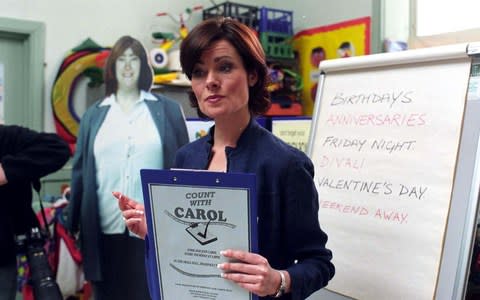How 'diet' became a dirty word in the age of wellness

As somebody who started out as a journalist on a health magazine in the early 2000s, I spent a lot of time writing features about dieting, dropping dress sizes and so on. Later, when I was a health editor on a glossy magazine, new books would land in my in-tray daily with words like ‘shred’, ‘shrink’ and promises of how to ‘lose a stone in 6 weeks!’ proudly displayed on the cover.
But then things started to change. Slowly, those words were replaced with terms like ‘wellness’, ‘get strong’ and ‘eat clean’. Cover lines about dwindling dress sizes started to seem outdated; mean spirited, even, and as the body positivity movement gathered pace, encouraging women to embark on endless diets was soon deemed little short of ‘shaming.’
In December 2015, Amy Keller Laird, the then editor-in-chief of US Women’s Health magazine, summed up this feeling when she wrote an open letter to her readers, vowing to ditch the epithets ‘Bikini Body’ and ‘Drop Two Sizes’ from her front pages for good.
“Since our goal is to always pump you up, and never to make you feel bad, here’s our pledge: they’re gone,” it read. “They’ll no longer appear on Women’s Health covers.” Her note also came with news of the three words that topped the list of readers’ favourites: toned, strong and sexy which, Laird added, “thrills me.”

While the gist of the features inside magazines generally stayed the same - eat less, move more - everyone, it seemed, was soon getting on board the strong-not-skinny bandwagon. Sport England launched their This Girl Can campaign in 2015 to shift the focus on exercise from appearance to fitness, social media hashtags like #fitnotthin became popular, and health books, wellness bloggers, personal trainers and nutritionists now talk in terms of wellness, energy and strength, rather than weight or dress sizes.
So it should probably come as no surprise that Weight Watchers has this week rebranded itself as WW, to reflect its shift from focusing on weight loss to overall health and wellbeing.
Mindy Grossman, the company’s chief executive, said WW no longer denotes Weight Watchers but rather “represents our heritage and history and what we are going forward. Like any brand, we have to stay relevant.” Oprah Winfrey, a member and significant shareholder in the company, says its role now “goes far beyond a number on the scale.”
But does it really? Because while this apparent departure from encouraging women to take up brutal bikini diets is a positive thing, surely somebody going to Weight Watchers just wants to, well, lose some weight?

“I have no issue with the word weight,” says former Weight Watchers member Laura Gilkerson, a 43-year-old teacher from Surrey. “Although when I talk to my sons, aged eight and five, I don’t say I’m on a diet but that I want to be healthier and look after my body. I don’t talk about food in terms of weight, fat or dieting either. But when I joined Weight Watchers and then Slimming World it was because I was clearly overweight and I wanted to lose some of it. It was that simple.”
In her experience, “Weight Watchers [was] quite full on (they told me I was making excuses when I hadn’t lost weight one week), so I joined Slimming World in May,” Gilkerson explains, “and found them more open and encouraging.” She has since lost two and a half stone and crucially, she says, “I feel healthier for it.”
“The fact is, organised diets work,” says nutritionist Ian Marber. “Giving people who want to lose weight a structure works, and has been shown to make weight loss easier. However, I assume Weight Watchers would like to participate in the wider commercial opportunities that currently exist in the world of wellness, which is no bad thing.
What's wrong with talking about losing weight, if it's done in a healthy way?
Ian Marber
“But let’s be honest,” he adds, “dropping the word ‘weight’ is no more than a brand exercise. By removing the word, which along with ‘diet’ has become so loaded in recent years, they want us to think the company’s aim is to make people healthier. But health and weight have always been conflated. And anyway, what’s wrong with talking about losing weight or limiting your weight, as long as it’s done in a healthy way?”
He notes that many of the highly successful ‘wellness influencers’ who post about their seemingly virtuous eating habits on Instagram promote cutting out food groups to “improve energy” and “be well”, or exercising to “feel strong” and “toned”. But it means the same thing as when Weight Watchers, or other slimming groups, talk about watching what you eat and exercising to lose weight. It’s the same thing, just re-packaged in a glossier format.
Weight Watchers was founded in 1963 by American Jean Nidetch, who described herself as a ‘formerly fat housewife’, in a room above a cinema in Queens, New York. Her thoughts about weight were brutally frank compared to the company’s approach today: “If purple shortbread made you break out in purple spots, you wouldn’t eat it,” she wrote in 1972. “But do you think fat is prettier than purple spots? It’s uglier and harder to get rid of.”

Since then the company has softened its stance, gone global, enlisted celebrity fans including Tina Fey, Jennifer Hudson and Patsy Kensit, and is currently worth $2.9bn with 4.5million members. All this, despite its slightly dated image and competition from diet trends like Atkins, paleo, keto, intermittent fasting and the endless fitness and diet apps that have launched in the last few years. In fact, studies show millennials are increasingly turning to retro diet clubs like Weight Watchers, which is now known as ‘Dub-Dub’ to its younger fans.
“We’ve been in people’s lives for a long time, so you are not the new shiny penny out there,” Grossman said last year. “But you really are the one that works.”
Which appears to be true: a study from Britain’s Medical Research Council found that Weight Watchers is a “clinically effective intervention to treat obesity.”
Which is much needed, given one in three UK adults are currently overweight, according to researchers from University College London, and that obesity will overtake smoking as the biggest cause of cancer among women come 2043. “The paradox is that everyone is talking about wellness and nobody wants to use the words diet or weight, but we’re not getting healthier,” Grossman added.
The paradox is that everyone is talking about wellness and nobody wants to use the words diet or weight, but we’re not getting healthier
Weight Watchers chief executive Mindy Grossman
So, can a weight-less Weight Watchers work? “Who knows,” says Ian Marber. “But if [the company] isn’t about weight, what will happen in the meetings now? Will somebody who wants to lose a stone turn up and when they’re asked to step on the scales, say, ‘I’m not telling you what I weigh. Surely it’s got nothing to do with weight?’
“Because in reality,” he says, “it really has.” And while diet may have become a dirty word, it’s surely one the nation – now the fattest in Europe – can’t afford to ignore.


 Yahoo News
Yahoo News 